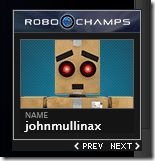Why RoboChamps has something for you
Do you like robots? How about the idea of robots? Wish you had your own, but don't have time to build from scratch or a few thousand dollars to buy one? Ever think it would be cool to control the Mars rover?
 If so, check out RoboChamps where you can develop and control robots without actually needing the robot. Write real code to control simulated robots in simulated environments over the Internet! There are even challenges to complete, and yes, you can program and control the Mars rover (at least, a simulated version). The only way to have more robot fun would be if someone gave you one... and if you compete the in tournament someone just might!
If so, check out RoboChamps where you can develop and control robots without actually needing the robot. Write real code to control simulated robots in simulated environments over the Internet! There are even challenges to complete, and yes, you can program and control the Mars rover (at least, a simulated version). The only way to have more robot fun would be if someone gave you one... and if you compete the in tournament someone just might!
Why RoboChamps and whose behind it?
Microsoft created RoboChamps to help people overcome some of the traditional challenges of learning to develop for (ok, play around with ) robots, and to help folks interested in robots discover the Microsoft Robotics Developer Studio CTP1 that was recently released. Excerpt from the RoboChamps overview page:
"While there has long been a large audience interested in robotics, there have also been a number of barriers to entry, both real and perceived. Robots are not widely available in traditional retail stores. If one could find a programmable robot, the cost was often times non-trivial. In addition, the ‘robot’ that could be purchased was often in the form of a kit and required hardware knowledge and skills. And if one could both find and afford a robot, there was a perception that programming one must be difficult.
"RoboChamps is a new robotics programming league that removes those barriers to entry and makes robotics available to a broad audience. RoboChamps is based in simulation, which removes the barriers to entry of availability, cost, and deep hardware knowledge."
 The RoboChamps site has a community dimension (forums, blog, etc.), learning materials, a competition league, and you can get a Vista sidebar gadget to keep track of feeds and competition standings, as well as other "robot bling". You can login with your Windows Live ID, and all the software needed to control your RoboChamps robot is free and downloadable via links on the RoboChamps site -- and it's the same software you would use to write code for real robots.
The RoboChamps site has a community dimension (forums, blog, etc.), learning materials, a competition league, and you can get a Vista sidebar gadget to keep track of feeds and competition standings, as well as other "robot bling". You can login with your Windows Live ID, and all the software needed to control your RoboChamps robot is free and downloadable via links on the RoboChamps site -- and it's the same software you would use to write code for real robots.
Are you thinking, "Cool, but so what?"
Check out Mary Jo Foley's post, Why business users should grab a copy of Microsoft’s new robotics toolkit. Would you have guessed that MySpace uses the current version of Microsoft's Robotics Studio toolkit to program across it's own distributed network? In particular, they (and others) are interested in somethings called the Concurrency and Coordination Runtime (CCR) and Decentralized Software Services (DSS) for developing multi-core distributed systems. CCR makes easier to handle IO asynchronously to smooth data flow and better manage computational resources. Essentially, think "theory of constraints" on a micro scale.
The DSS provides "a flexible foundation for defining applications as compositions of services interacting in a decentralized environment" (see here). Among other things, DSSP helps you create applications that are contextually aware and can change behaviors based on events like changes in state within an environment -- even across many different sensor inputs. For a conceptually simply example:
"If gas tank is less than half full, set transmission shifting pattern to 'fuel-saving' profile."
Or, you might orchestrate a system to adapt it's behavior based on a composition of many services:
"If gas tank is less than half full, set transmission shifting pattern and engine control unit strategy to 'fuel-saving' profile unless there is a gas station along my route AND gas is less than $2/gallon AND the gas station is closer than my estimated "miles-until-fuel tank empty".
These embedded automotive examples are a small-ish conceptual step from robots, but it's also possible to use DSS (as well as CCR) in many others kinds of systems -- including enterprise applications, modeling, scientific computing, etc.
Finally, here's a little bit of what BillG has to say about Robots (more here) a few months back:
"The challenges facing the robotics industry are similar to those we tackled in computing three decades ago. Robotics companies have no standard operating software that could allow popular application programs to run in a variety of devices. The standardization of robotic processors and other hardware is limited, and very little of the programming code used in one machine can be applied to another. Whenever somebody wants to build a new robot, they usually have to start from square one…. Despite these difficulties, when I talk to people involved in robotics–from university researchers to entrepreneurs, hobbyists and high school students–the level of excitement and expectation reminds me so much of that time when Paul Allen and I looked at the convergence of new technologies and dreamed of the day when a computer would be on every desk and in every home."
Good luck with the Mars Rover!
Technorati Tags: Robots